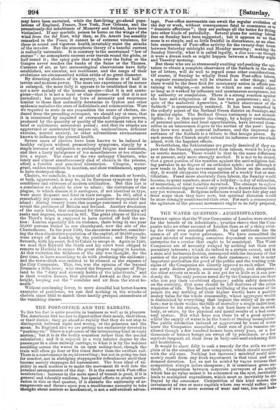THE POST-OFFICE AND THE SABBATH.
To live too fast is quite possible in business as well as in pleasure The Americans live too fast to digest either their meals, their ideas, or their duties ; they go ahead so rapidly that they do not stop to distinguish between right and wrong, or the generous and the mean. In England also we are getting too exclusively devoted to "pushing on." There is a pleasure of the intoxicating kind in rapid motion ; but it is in the bodily sensation rather than the mental calculation ; and it is enjoyed in a very inferior degree by the passenger in a close railway carriage, to what it is by the mariner scudding across the waves in an open sailing-boat, though the train will often go four or five times faster than the swiftest sail. There is a convenience in rapid travelling ; but not in going too fast for comfort, not in abridging stoppages for refreshment until they become merely stoppages for harassment. The beau ideal of ra- pidity in such matters is to make the movement fit well into the personal arrangements of the day. It is the same with Post-office acceleration : increase in the mere speed of transit is good, if it is general and tolerably uniform; but special efforts to attain accele- ration in this or that quarter, if it disturbs the uniformity of ar- rangements and thrusts upon you a troublesome necessity to take thought about matters so mechanical, is not a self-evident advan- tage. Post-office movements can await the regular evolution of the day or week, without consequences fatal to commerce or to "domestic affections "; they are perhaps all the better for fitting into other kinds of periodicity. Several plans for setting labour free on Sunday have been suggested; but it appears to us that none is so simple, and so little fruitful in disturbance, as an shoo. lute suspension of Post-office activity for the twenty-four hours between Saturday midnight and Monday morning ; making the Sunday literally, what it is called legally, a dies non—as though it were a dream such as might happen between a Monday night and Tuesday morning.
But those who are so strenuously exciting and pushing the agi. tation to obtain a complete observance of the Sabbath in the mat- ter of letters, will do well to regard some other consideratione. Of course, if Sunday be wholly freed from Post-office labour, a cognate emancipation will be attained in other things; and there would be the freer field for missionary action in affairs per.. tamingto religion,—an action to which no one could object so long as it worked by influence and spontaneous acceptance, not by authority or compulsion. There is a strong reaction against the bare anti-religionism of the last two generations ; and, in spite of the maladroit Agnewites, a "better observance of the Sabbath" is spontaneously rendered. It has been remarked in the orderly aspect of the Bethnal Green district on Sundays, and in similar signs. The Bethnal Green testimony is not unintel- ligible ; for in that quarter the clergy, by a happy combination of personal qualities and local opportunities, have devoted them. selves in an uncommon degree to the service of the poor: hence they have won much personal influence, and the improved ob- servance of the Sabbath is a tribute to that benign power. By such means the Church might extend its influence over the whole island, with the happiest effects. Nevertheless, the Sabbatarians are grossly deceived if they ex- pect that the Sunday, emancipated from labour, would be kept in an ascetic manner. There would in that be the same differences as at present, only more strongly marked. It is not to be denied, that a great portion of the reaction against the anti-religious feel- ing partakes in no degree of an orthodox spirit ; and although it now tends toS help the movement against labour on the seventh day, it would disappoint the expectation of a weekly fast or mor- tification. Freed more absolutely from labour, the Sunday would become, to great numbers, more of a holyday—a day of relaxation, of recreation, of vital faculties recruited. The attempt to enforce an ecclesiastical rigour would only provoke a fiercer reaction than any yet witnessed. Religious influences would have fair play and freer scope than they have now, but spiritual dictation would be more strongly counteracted than ever. For such a consequence the agitators of the present movement ought to be fully prepared.
























 Previous page
Previous page